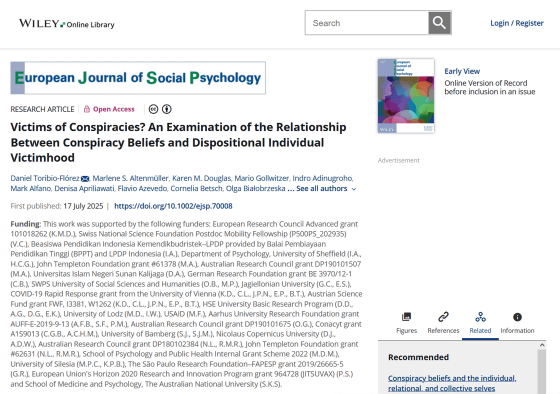Research shows that people with a strong sense of victimhood, who believe they are being treated unfairly, are more likely to believe in conspiracy theories

Many conspiracy theories are extremely dubious and far-fetched, yet somehow some people believe them. A new study, analyzing responses from approximately 15,000 people in 15 countries, found that people with a strong sense of personal victimization, or 'I've been treated unfairly,' are more likely to believe in conspiracy theories.
Victims of Conspiracies? An Examination of the Relationship Between Conspiracy Beliefs and Dispositional Individual Victimhood - Toribio‐Flórez - European Journal of Social Psychology - Wiley Online Library

Sense of personal victimhood linked to conspiracy thinking in large international study
https://www.psypost.org/sense-of-victimhood-linked-to-conspiracy-thinking-in-large-international-study/
Previous research has focused on the idea that conspiracy theories are driven by a sense of collective victimhood, a feeling that one's group has been historically victimized. 'Many conspiracy theories are rooted in the belief that a group has been secretly and maliciously wronged or targeted by a powerful group,' says Daniel Toribio Flores , a postdoctoral researcher at the University of Kent in the UK.
However, in certain social contexts, people may perceive themselves as victims of injustice and respond accordingly, regardless of their group identity. Therefore, an international research team led by Toribio Flores investigated how people's personal sense of victimization is associated with conspiracy theories.
'We were interested in whether people who tend to see themselves as victims also tend to believe in conspiracy theories,' Toribio Flores said. 'To investigate this, we worked with a multinational team of researchers and collected data from 15 countries. This allowed us to test whether the patterns we observed hold across different cultural and social contexts.'

As a preliminary step to collecting international data, the research team analyzed the results of two surveys conducted in Germany. The two surveys involved a total of 743 people, including members of the general public and students, and ranged in age from teenagers to seniors, with a majority of participants being women.
Participants answered questions to measure 'victim justice sensitivity,' the degree to which they notice and react angrily when they perceive injustice. They also answered questions measuring various conspiratorial thinking, and in one survey, other characteristics such as distrust, intolerance of ambiguity, desire for control, and political orientation. Analyses revealed a small to moderate positive correlation between victim justice sensitivity and conspiratorial thinking in both surveys. This correlation remained statistically significant even when controlling for factors such as distrust and desire for control.
Following these results, Toribio Flores and his colleagues conducted a large-scale survey of approximately 15,000 people in 15 countries, including Australia, Austria, Chile, Colombia, Denmark, Germany, Greece, Indonesia, Mexico, New Zealand, Poland, Russia, the United States, and Costa Rica.
The survey measured victim justice sensitivity using items such as 'I get angry when others are unfairly better off than me' and 'I feel anxious when I work hard but can't get what others can get easily.' The survey also examined the strength of belief in conspiracy theories using items such as 'authorities often cover up the truth,' 'global warming is a hoax engineered by scientists,' and 'scientists are hiding the dangers of vaccines.'
When the research team analyzed the data, separating individual-level and country-level influences, they found that people with a high victim justice sensitivity were more likely to believe in conspiracy theories. This tendency was strongest for the general conspiracy theory that 'authorities often conceal the truth,' somewhat weaker for vaccine-related conspiracy theories, and weakest for climate change conspiracy theories. Furthermore, even after controlling for demographic factors, political orientation, and religiosity, the association between general conspiracy theories and victim consciousness remained significant for vaccine-related conspiracy theories.

'Our data show that people's personal tendency to perceive and respond to injustice as a victim is weakly but positively correlated with belief in conspiracy theories, even when controlling for indicators such as collective victimhood and exposure to collective violence,' Toribio Flores told PsyPost. 'In other words, people who tend to see themselves as victims are somewhat more likely to endorse conspiracy theories, regardless of how victimized they perceive others in their country or how much collective violence their country has recently experienced.'
The association between victim mentality and belief in conspiracy theories varied by country, with the association being stronger in countries like the United States, New Zealand, and Australia, and weaker in countries like Costa Rica, Chile, and Colombia. While the association tended to be stronger in more individualistic countries, no clear factors were found to explain these differences.
'We cannot say for sure whether a tendency to feel like a victim leads to greater belief in conspiracy theories, or vice versa,' Toribio Flores said. 'Some research suggests that belief in conspiracy theories may increase feelings of victimization, but further experiments are needed to understand the direction and nature of this relationship.'
Related Posts:
in Science, Free Member, Posted by log1h_ik







